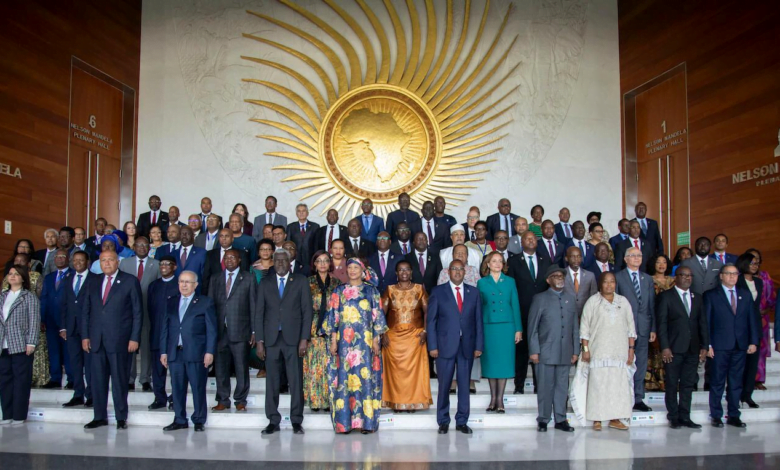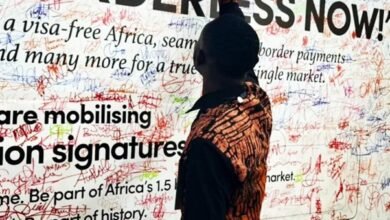Dhoihir Dhoulkamal : “We Can, however, be proud of the substantial progress made in 2023”
On February 14, 2024, the Minister of Foreign Affairs of Comoros, the country currently holding the AU presidency, opened the 44th ordinary session of the African Union's executive council, highlighting major challenges facing Africa such as terrorism, climate change, and political tensions. However, he also highlighted significant achievements of the previous year, including commitment to climate action and the African Union's accession to the G20.

By Dhoihir Dhoulkamal*
While terrorism and violent extremism continue to threaten the survival of some of our states, an epidemic of unconstitutional changes has shaken the continent in the past two years, putting to the test the democracy progress observed in Africa so far.
The proliferation of hotspots, with the return of the old demons of war in Sudan, the persistence of insecurity in eastern Congo, and the civil war in Libya, are all challenges that significantly slow down our collective momentum towards development.
And as if that weren’t enough, one of our most dynamic Regional Economic Communities, namely ECOWAS, is now facing the withdrawal of three of its member states, thus undermining the economic integration process of our continent.
Beyond these security and political challenges, Africa remains the most exposed region to climate change. While it only contributes marginally to greenhouse gas emissions, it nonetheless suffers the repercussions: rising temperatures, droughts, coastal erosion, floods, etc.
Moreover, while we were still recovering from the economic wounds caused by the Coronavirus pandemic, the war in Ukraine came to remind us of a sad reality: our strong dependence on foreign countries for food.
Indeed, this armed conflict, which is thousands of kilometers away from Africa, has seriously affected the economies of the continent; it has notably caused a surge in prices and disruptions in the supply chain of basic commodities.
Despite this rather bleak picture of Africa’s overall situation, we can, however, be proud of the substantial progress made in 2023
Excellencies,
Ladies and Gentlemen,
Despite this rather bleak picture of Africa’s overall situation, we can, however, be proud of the substantial progress made in 2023.
Africa’s voice has resonated in major international forums to defend the continent’s highest interests. At COP 28 in the United Arab Emirates, we called for a fairer energy transition and funding for climate change measures, including financing for adaptation. Western countries, the main polluters of the planet, must therefore increase funding for climate action and green growth for the benefit of Africa.
It is worth noting here the specificities of coastal and island states, which deserve special treatment due to their extreme vulnerability to climate change. The Moroni Declaration, which sanctioned the ministerial conference on the blue economy and climate change, held in June 2023 in the Comoros, is an essential reference in this regard.
We will continue to advocate for support for the Great Blue Wall initiative and for a blue economy that is both sustainable and job-regenerative.
The African Union’s accession to the G20 heralds a new era of hope and ambition for the African peoples
Excellencies,
Ladies and Gentlemen,
The year 2023 is to be inscribed in the annals of Africa’s contemporary history. It marks the culmination of a long struggle for the international recognition of Africa as a major player in the global economic landscape. The African Union’s accession to the G20 heralds a new era of hope and ambition for the African peoples.
We have also spared no effort to find a lasting solution to the various crises currently affecting the continent.
In Cairo, Addis Ababa, or Djibouti, the war in Sudan has mobilized efforts to try to bring the warring parties’ positions closer together. I dare to believe that the two rival factions, in a patriotic surge, will soon resume negotiations and thus shorten the suffering of the Sudanese population.
In the Sahel, political transitions in Mali, Niger, and Burkina Faso seem to be stalling. And the withdrawal of these three countries from the regional bloc is not conducive to a swift return to institutional normalization. It is up to ECOWAS to initiate, as soon as possible, frank and sincere discussions with its three member states to swiftly and positively resolve this damaging situation for both parties.
I call on countries that are still hesitating to join the momentum for a truly integrated Africa
Excellencies,
Ladies and Gentlemen,
Regarding regional integration, we should rejoice in the positive progress made in accelerating the implementation of the AfCFTA, the theme of the past year. I would like to extend my sincere congratulations to the member states that have ratified the necessary instruments and made the operationalization of this initiative possible. I call on countries that are still hesitating to join the momentum for a truly integrated Africa. The AfCFTA Secretariat deserves special mention here for its unwavering commitment to trade liberalization within the African space.
The war in Ukraine, as you know, has entered the agenda of the Comorian presidency of the African Union, with its impact on our agricultural system. Alongside some of his counterparts, President AZALI Assoumani conducted a mediation mission in Ukraine and Russia to try to find a compromise between the two parties.
The next step for our organization is to adopt the AU Convention on the Elimination of Violence against Women and Girls
In the field of gender promotion, the Comorian government and the African Union, in partnership with the African Women Leaders Network (AWLN), launched in October 2023 in Moroni, the third Consultation of African Women Leaders on the theme: « Boosting Engagement for Women’s Economic Empowerment and Ending Violence against Women and Girls. »
This conference, a prelude to the Third African Union Heads of State and Government Conference on Positive Masculinity, assessed progress in the fight against violence against women and girls in Africa and developed a roadmap for the next twenty years.
The next step for our organization is to adopt the AU Convention on the Elimination of Violence against Women and Girls.
Excellencies,
Ladies and Gentlemen,
The Union of Comoros, my country, has just held presidential elections and elections for governors of the islands in January, in which President AZALI Assoumani and candidates from the presidential camp were elected in the first round.
This dual election generally took place in a climate of peace and security, despite some minor incidents often linked to delays in the delivery of electoral materials.
We cannot thank the African Union and other partners of the Union of Comoros enough, who accompanied us throughout this process, both technically, logistically, and financially.
Despite the transparent atmosphere in which the election took place, as attested by the Declaration of all observers, some candidates, contesting the sovereign choice of the Comorian people, attempted to sow chaos by shamefully manipulating a portion of the youth.
President AZALI, true to his spirit of openness and in a peace-building approach, has expressed his willingness to collaborate with all stakeholders to build the future of the Union of Comoros together. We hope that this call, made immediately after the announcement of the final results, will be heard by the opposition in the higher interest of our country.
Excellencies,
Ladies and Gentlemen,
All the achievements recorded during this Comorian presidency of the African Union would never have been possible without the commitment of the Conference Bureau and the African Union Commission. I would like to express my eternal gratitude to them here.
I also want to pay tribute to the Executive Council, whose involvement and availability have allowed us to move quickly in the implementation of the strategic orientations set by our Heads of State and Government.
Finally, I pay tribute to the immense work of the Committee of Permanent Representatives, the Specialized Technical Committees (STCs), the bodies, and all the structures affiliated with the African Union. Their contributions have been of great help to us in fulfilling our mission.
Excellencies,
Ladies and Gentlemen,
Our current session is called upon to address major issues concerning the future of the continent, including:
- The state of implementation of the AfCFTA
- The conceptual note and roadmap for the 2024 theme on Education
- The African Union’s participation in the G20
- Elections of Members of the African Union Commission
- The draft strategic framework and orientation framework for partnerships
- The examination of the draft agendas and decisions of the Conference, or
- The adoption of decisions of the current session.
As you can see, dear colleagues, considering this agenda, we have our work cut out for us. It is up to us to examine these various points with a positive spirit and in a climate of serenity to achieve tangible deliberations.
Thank you for your kind attention, and I declare open the 44th session of the African Union Executive Council.
*Speech by Dhoihir Dhoulkamal, Minister of Foreign Affairs and International Cooperation, in charge of the Diaspora and Francophonie and Chairperson of the Executive Council of the African Union, Opening Ceremony of the 44th Ordinary Session of the Executive Council, February 14, 2024.






